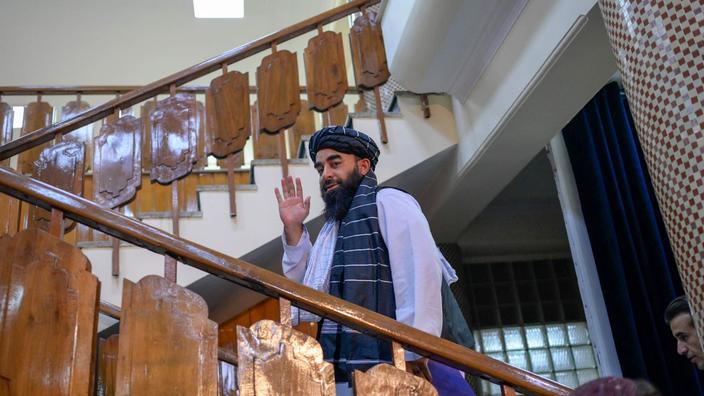Posing as the protector of the region, Russia intends, during a meeting in Moscow on Wednesday October 20, to convey to the Taliban its concern about the rise of jihadist groups, and to evoke the danger of a humanitarian crisis in Afghanistan.
This meeting, the first in Moscow since the change of the Afghan regime, will see the participation of a dozen countries including China, Pakistan and Iran, according to Russian diplomacy.
It testifies to the integration of the Taliban in the diplomatic game, after the meetings in Qatar with the West and in Turkey last week.
To discover
EXCLUSIVE - With the new masters of Kabul, our report at the heart of the Taliban power
Read also In Afghanistan, the Taliban stage their vision of women
In Moscow, the Taliban will be represented by Deputy Prime Minister Abdul Salam Hanafi, an official who participated in the negotiations on the US military withdrawal. Taliban spokesman Zabihullah Mujahid therefore considered that these talks strengthened
"the stature"
of the new Afghan government. But for Russian diplomacy, it will above all be a question of
"the politico-military situation in Afghanistan and the formation of a government"
bringing together beyond the movement in charge of the country. Kremlin spokesman Dmitry Peskov described the meeting as an
"attempt to understand what is going on"
.
Because since their flash return to power in August, the Taliban have faced the threat of groups more radical than them, in particular the bloody attacks of the Islamic State - Khorasan (EI-K).
Vladimir Putin and other Russian officials expressed concern last week about the Taliban's ability to stabilize the country and prevent the anchoring of jihadist groups with cross-border ambitions.
The Russian president estimated that some of them were already preparing
"plans to extend their influence in the countries of Central Asia and Russian regions"
.
"The period of euphoria" has passed
If Russia has mocked the humiliating withdrawal from Afghanistan of the United States, its great geopolitical rival, it fears to see this chaos spreading on its southern flank in Central Asia, a strategic region rich in raw materials. Moscow has also stepped up in recent months military maneuvers on the Afghan border with its regional allies, also strengthening its base in Tajikistan. China has also conducted exercises in the region. In addition, the Russians may have in mind that the current situation is not unrelated to the Soviet invasion (1979-1989), which marked the beginning of decades of wars in Afghanistan.
The other theme of the Moscow discussions will concern the risk of
"a humanitarian crisis"
, while the Taliban, under international sanctions, do not have the funds to run the banks and pay salaries. For Alexandre Sternik, a senior official in Russian diplomacy, quoted by the Ria Novosti agency, the situation is such that
"the Taliban, for lack of financial means, are losing their anti-terrorist potential, as evidenced by the attacks"
. During a meeting with Western diplomats in Qatar in mid-October, the Afghan Minister of Foreign Affairs, Amir Khan Muttaqi, warned that
"the weakening of the Afghan government is in no one's interest"
, evoking the security risk and that of a migratory exodus.
Read alsoAfter the Kunduz massacre, the Taliban challenged by the Islamic State
Russians, Turks, Iranians, Europeans: everyone is keen to avoid a refugee crisis. Putin also considers that the jihadists would take the opportunity to spread their men in Central Asia and Russia. Zamir Kabulov, the Kremlin's envoy for Afghanistan, noted in this context that
"the period of euphoria"
of the new masters of Kabul had passed. Russian authorities have been talking to the Taliban, a movement that has been banned in Russia for years, but they do not immediately intend to recognize them as the legitimate government of Afghanistan. Since August, Moscow has been indulgent, even laudatory when it comes to the Taliban. But she also hammered home that stabilizing the country required involving other Afghan factions in the exercise of power.
At the same time, most of the countries of ex-Soviet Central Asia have established relations with the Taliban, like Uzbekistan, with whom there has been recent discussion of trade and humanitarian aid.

